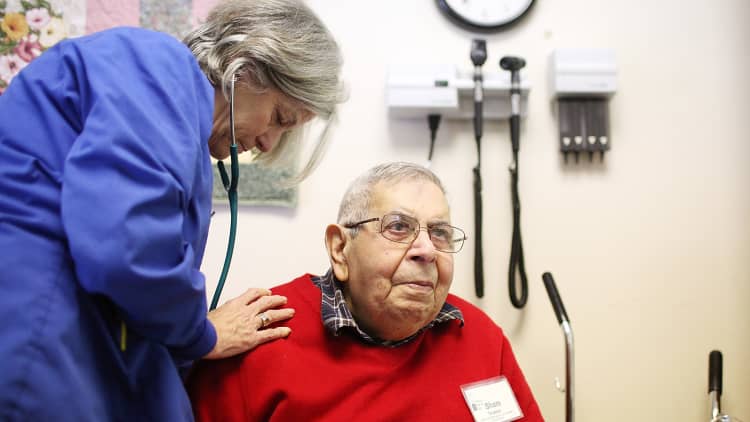They're called "fecal transplants."
The process involves taking filtered and treated solid human waste from one person and injecting it into someone who's suffering from Clostridium difficile, or C-diff, one of the deadlier "superbugs" that are resistant to treatment with antibiotics.
What makes fecal transplants so interesting to medical professionals is that they appear to work—producing a 90 percent cure rate, according to experts. But as they begin to take greater hold, concerns are rising about the dangers of a potential black market for the treatment.
"Our biggest concern is the commercialization of fecal transplants and selling them for thousands of dollars," said Dr. Zain Kassam, chief medical officer for OpenBiome, a nonprofit group that provides hospitals with screened fecal matter for clinical use.
"That could lead to a black market where people are doing this for themselves," said Kassam.
Black marketeers and do-it-yourselfers may not be able to handle the process safely themselves because it's inherently dangerous to inject toxic waste from one person into another person.
Read MoreDeath & Dishonor: Crisis at the VA
One private company that hopes to provide the next generation of fecal transplant medication is taking on the business opportunity.
"We're a drug company, and we see this as a way to open new markets," said Lee Jones, CEO of Rebiotix, a biotech firm started in 2011 and funded by angel investors.
"Black markets are a concern, but more of a minor one," said Jones, who added that there are about 10 other companies like hers developing fecal treatments.

C-diff is a bacteria that strikes the digestive tract and causes severe diarrhea and life-threatening inflammation of the colon. At least 14,000 people in the U.S. are estimated to die from it each year, according to the Centers for Disease Control and Prevention.
It mostly affects older adults in hospitals or in long-term care facilities and typically occurs after the use of antibiotic medications.
Read MoreThe BIG threat to Obamacare (that you've never heard of)
C-diff is resistant to most current antibiotic treatment—-which can cost thousands of dollars—so many sufferers have decided to move beyond the "yuck factor" and turn to fecal transplants.
Along with the 90 percent cure rate cited by experts, relief can happen as quickly as hours or days.
Costs and providers at issue
Fecal transplants begin with a donor's solid stool, which is treated and filtered by a clinician and stored in freezers for later use. They're most commonly injected by enema, but can also be inserted by colonoscopy or even through a nose drip down into the stomach.
But costs and the difficulty of finding doctors to provide the transplants are creating issues for some potential patients.
Read MoreWhat we really think about that wellness program
The Federal Drug Administration is regulating fecal transplants as an experimental drug. That has some doctors and hospitals worried about performing them, because of safety issues, according to experts.
That in turn has led to do-it-yourself transplants, but mistreated fecal matter can lead to serious diseases, like hepatitis and HIV.

Getting a screening stool sample can cost patients up to $1,500 per use. And not all insurance companies cover them. The cost of a transplant can be covered when done by colonoscopy, which can average around $1,000.
OpenBiome, which operates on grants and donations, charges hospitals $250 per treatment to help cover costs.
Read MoreThe underworld of cheap drugs
But an FDA-approved drug would help get more of the medical profession on board with the procedure, said Jones.
"We get calls from doctors who want a standard product to give to their patients," said Jones, who added that her company is going through its second round of funding.
'Made my life so much better'
For those who have gone through fecal transplants, the benefits are clear.
"I've done it twice, both times in 2012," said 58-year-old Catherine Duff of Carmel, Indiana. "It's made my life so much better."
Duff, who runs the Fecal Transplant Foundation, a nonprofit group that promotes awareness of fecal transplants, said her quality of life had gotten so bad she thought it would be better to die. She was going to the bathroom 20-30 times a day.
Read MoreHobby Lobby outrage? Here's a simple fix
Duff did her first transplant herself by enema. She read instructions online when she couldn't find a provider. She used her husband's stool after it was treated at a medical lab.
But that's something Duff said she doesn't advise. Neither does the CDC.
"We want the whole process to move to a safer product," said the CDC's Dr. Clifford McDonald, who added that C-diff is an urgent health threat.
'People are dying'
Jones, who said her mother and sister suffered from C-diff, explained that the FDA has given her firm the fast track to develop a fecal transplant product.
However, Jones said it would take at least a couple of years before it hits the market.
James Burgess, executive director of OpenBIome, said his group welcomes a company like Rebiotix but doesn't think transplants should be regulated as a drug product.
For Duff—who said she often refers the dozens of inquiries she gets about fecal transplants to OpenBiome—the best treatment for C-diff is already here.
"We know fecal transplants are not experimental," she said. "People are dying and I'm worried that waiting for a drug to come out will cost more lives."
—By CNBC's Mark Koba


